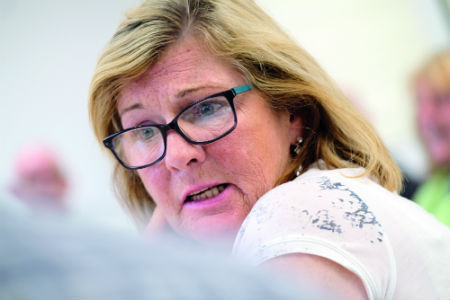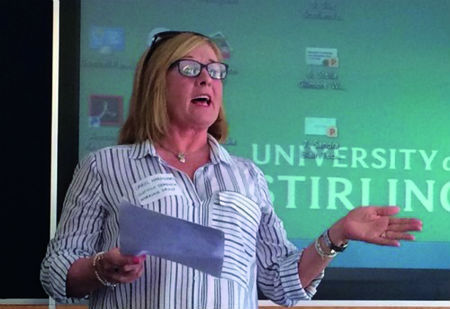Main content

Carol Hargreaves is one of the Vice Chairs of the Scottish Dementia Working Group (SDWG). About ten years ago, while she was managing a chain of bookmakers, she noticed changes and went to her GP. She had a difficult time getting her diagnosis, this was made harder because she was under 65.
Carol and the other members of SDWG campaign to make sure no one goes through dementia alone, especially those at risk of being missed by services due to their age, disability, gender, race or sexual orientation. Carol often shares her experience of getting a diagnosis to show others that there is hope and to advise professionals that not everyone fits the stereotype.
“I was in my work and I started giving the cashiers jobs that I should’ve been doing. Somehow I knew I couldn’t cope with all this money and all the lines. Then the mini strokes started, but I didn’t realise they were happening. Other people would notice a slight change in my face and my speech and tell me. Now if I’m tired or stressed my speech will still go funny, it’s a reminder and it hits me, because I feel so well.
My GP wasn’t great, but they referred me to my psychologist, but at the time she was off sick. Other doctors put it down to bipolar. They wanted me to go into hospital of my own accord, but I knew my body and I knew it wasn’t the bipolar. So I was sectioned.
I was in hospital for about three months. My psychologist found out, she was still off sick, but she got involved. That’s when they started sending me for scans and things. In between this I was taking mini strokes like taking coughs, I was always in an ambulance. It was a really dark time. I was always put in a ward of four patients, with much older women who had suffered strokes too. I had to go to court; what a carry on. It was a panel; my psychologist put a letter in saying how well she knew me and that she knew it wasn’t the bipolar. Then the scans showed it was dementia. This psychologist that I’d never meet before was called in and she said “I’m sorry to tell you the scan has shown vascular dementia; we’ll get you information but you’ve probably got a good six months so get your affairs in order”. Nobody should be told they’ve got a serious illness alone.
Then came the big book of information, I still don’t know where it is now, I’ve never read it. No one ever explained or told my family; my mum still doesn’t believe it. That was when Susan (my Alzheimer Scotland outreach worker) came into my life. I had just turned 50. My psychologist got her up to talk to me and she asked me if I would take counselling. Me being me, I said no. My family were told to watch me like a hawk, they wrapped me up in cotton wool. I would say I lost three years of my life. Whenever I turned around someone was there. Then I got involved with the counsellor; I found out it wasn’t about them it was about me not accepting. I can’t change other people.

I started volunteering with Susan and the group; we all started together. That was until people I knew started to deteriorate, I told Susan I couldn’t cope with that. So she suggested SDWG. I took the bull by the horns and went in by myself. At the next meeting Anne Macdonald (who is currently the other Vice Chair) was there for the first time, and we’ve been together from the beginning.
Once I get comfortable with people I’m fine. I love working in groups, I get a real buzz out of working with others. Back in those dark days, if I went anywhere they were looking for me. Since I’ve been with the SDWG it’s changed for the better. My family were all surprised to find out I was good at public speaking. I don’t know where that came from! I can’t say I’m not nervous, but I don’t find it hard speaking in public. I only speak about me; it’s nothing I don’t know. That’s all I can talk about is my life, my experience. A lot of laughter. I love it when we get together, and we are sad when someone is ill; you don’t get that elsewhere. All I can say is I thought I’d be dead by now, but life is so full. My whole life changed, from me having my son and step daughters, to moving into a flat on my own. There has been a lot going on with family in the last few years and I was able to be there for them. Me and my sister have a fantastic relationship and we look after my mum together. It is good knowing the new people who are joining the group and hearing that things are changing and getting better”.
Find out more about the Scottish Dementia Working Group and how you can get involved.

